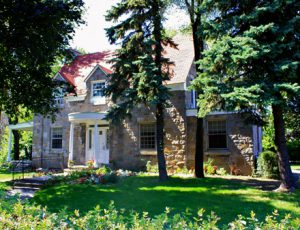
By Elizabeth Dvergsten-Beauce
[Editor’s note: Identifiable information has been changed in the following article to respect the anonymity of clients at Chabad Lifeline.]
I’ve always thought that I need to travel to far away places to gain unique experiences that would be relevant to me as a social worker. So, travel is what I did, and the experiences taught me a lot. But somewhere along the way, as I was noticing problems that exist in other countries, I realized I had been wearing rose-colored glasses and was blind to the problems that existed in my own home. When I concurrently started the Master’s in Social Work program at McGill and my student internship this fall, I fully realized there’s still a lot I need to learn about the place I call home.
Rabbi Ronnie Fine founded Chabad Lifeline over twenty years ago when he was working as a Chaplain at McGill. Today it has grown into a non-sectarian organization in Montreal that provides support to individuals and families struggling with addictions. In my short time here, I’ve learned that addiction can affect anyone; one of the most important things a person can do to provide support is to guide individuals to appropriate professional services that have experts in the field of addiction.
Sharing life experiences
It’s 11:45 a.m. on Tuesday, Nov. 20, and Chabad Lifeline is buzzing with people. The weekly speaker’s meeting starts promptly at noon. The meeting is open to anyone – individuals and family members that struggle with addictions, friends, and members of the community. It’s a great support for those struggling with addiction; it also educates the public, and helps to reduce the stigma and shame associated with the disease.
There are a few new faces in the crowd, which is always a wonderful thing to see. The room is full as old friends reunite and warmly welcome the new ones. Everyone introduces his or herself, and shortly thereafter, the speaker is introduced. A recovering alcohol and drug addict, John opens up about his early years of drinking and using, and the destructive path it led him down.
Afterwards, those who feel compelled to share express how John’s story resonated with them. For many, it’s a reminder about how working the 12-steps of Alcoholics Anonymous can change someone’s life. For others, it’s his openness about how he overcame a horrific drug-related trauma and remained sober. For everyone, regardless of their background, John’s story is one of courage and humility, and a reminder of how important it is to be open and true to ourselves. As hard as it is sometimes, showing our vulnerability allows us to lead by our weaknesses, and inspires others to take a deeper look at how we can change from the inside out. By letting our guard down, we’re able to connect with others, and most importantly, connect with ourselves.
There’s a quick turn-around time between meetings on Tuesdays. As the speaker’s meeting is wrapping up at 1 p.m., others are starting to come in for the 1:30-3 p.m. family support meeting.
I’ve learned from the group over the past few months that professional and expert support for family members of addicts is absolutely crucial. Unfortunately, it’s something that is hard to come by in this city.
As one member said, going home after the Tuesday meetings gives her a little more courage to do the hard stuff – to care for herself and her family, to provide healthy support to her family member with an addiction, and to integrate the great advice from the other group members into her own situation. Despite their raw and heartbreaking stories that always bring tears to my eyes, there’s an undeniable thread of hope and resilience in each person in the room. It’s hope that sustains family members and helps them through the hard times.
Putting together shattered lives
Thursday, Nov. 22 is another busy day at Chabad Lifeline. By the late morning, I’m sitting in the addiction counselor’s office with a client, working on a treatment plan. She is her early twenties and has quite the police record to show for her young age. Not surprisingly, all charges are drug and alcohol related.
She came to Chabad Lifeline because she finally realized her substance use was more than occasional fun and games. Her life spiraled out of control because of her addiction, and she wanted help. Thankfully, with the network of rehabs and support groups Chabad Lifeline is connected with through the city, province and country, we’re able to get her on the right track to recovery.
Friday, Nov. 23 is a quiet day for me. Fridays are a time for me to reflect on the week’s activities and how I’ve applied what I’ve learned in my social work classes directly to my experiences in the field. As I’m spending more time at home these days rather than travelling, I’m learning that there’s a lot of work to do right in my own community. As an intern working in the field of addictions, one of the things I can do is create awareness by sharing my experiences. If you’re interested in attending our Tuesday group meeting from 12:00 – 1:00 p.m., feel free to drop in. My office door is always open, and I’d be happy to tell you more about the amazing work that happens here at Chabad Lifeline.
Elizabeth Dvergsten-Beauce is currently enroled in McGill’s School of Social Work Qualifying Year entry into the MSW Program. She has a Bachelor of Arts degree from the University of North Dakota. Her experience includes working with military families and assisting newcomers to Canada, as well as working and volunteering for the Canadian Red Cross’ Disaster Management and RespectED: Violence and Abuse Prevention Education Programs.
For more information about Chabad Lifeline, click here.
